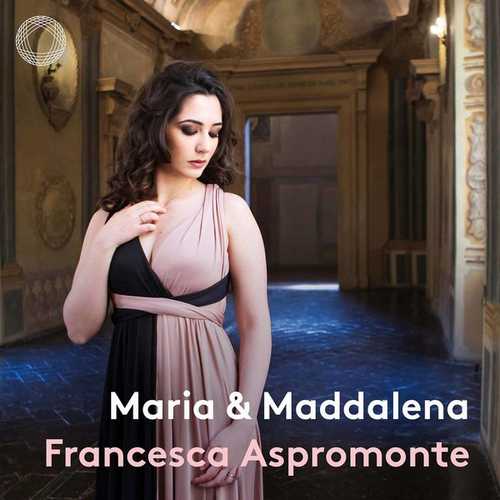

Composer: Giovanni Battista Bononcini, Antonio Caldara, Antonio Draghi, George Frideric Handel, Giovanni Lorenzo Lulier, Giacomo Antonio Perti, Alessandro Scarlatti
Performer: Francesca Aspromonte, Boris Begelman, I Barocchisti
Conductor: Diego Fasolis
Format: FLAC (tracks)
Label: Pentatone
Catalogue: PTC5186867
Release: 2021
Size: 1.25 GB
Recovery: +3%
Scan: yes
Lulier: Oratorio à 6 per la Nascità del Redentore
01. Di quei lampi che vanta l’aurora
Bononcini: La conversione di Maddalena
02. Del favellar divino
Draghi: Il Crocefisso per Grazia
03. Ecco qui l’incomprensibile
Caldara: La Maddalena ai piedi di Cristo
04. Sinfonia
Bononcini: La conversione di Maddalena
05. Cor imbelle a due nemici
Caldara: La Maddalena ai piedi di Cristo
06. Omai spezza quel nodo
Bononcini: La conversione di Maddalena
07. Sì sì, risolvo col mio dolore
Lulier: Oratorio à 6 per la Nascità del Redentore
08. Tu dormi o Figlio
Bononcini: La conversione di Maddalena
09. Sinfonia
Perti: La sepoltura di Cristo
10. Del Nazareno non era in seno
Caldara: La Maddalena ai piedi di Cristo
11. Deh, s’un tempo percossa
Perti: Gesù al Sepolcro
12. Giovanni, ah tu del Figlio
Handel: La resurrezione, HWV 47
13. Overture
14. Se Maria dunque spera
15. Se impassibile, immortale
Scarlatti: La Santissima Annunziata
16. Stesa à piè del tronco amaro
On her second Pentatone album Maria & Maddalena, star soprano Francesca Aspromonte explores the Two Marys in oratorios by Lulier, Bononcini, Leopoldo I d’Asburgo, Caldara, Perti, Handel and Scarlatti, partly in new editions, documenting the extremely bloom of the genre in the years around 1700. She performs these works together with violinist Boris Begelman as well as the seasoned players of I Barocchisti under the baton of the eminent Diego Fasolis. Traditionally seen as two feminine opposites, with far-reaching moral implications, Aspromonte brings the Virgin Mary and Mary Magdalene together as two beautiful and strong women who turned their lives upside down by making the choice to dedicate themselves completely to an ideal. Her interpretation of these exceptional pieces explores all the emotions of the Two Marys, constituting a fascinating and profoundly moving portrait of what it means to be a woman.
What a line-up. Baroque and classical repertoire specialist, soprano Francesca Aspromonte, on her second album as an exclusive Pentatone artist, supported by Diego Fasolis with his vivacious early music ensemble I Barocchisti, plus a guest turn from violinist Boris Begelman, fresh from his own zinging “Le nuove vie” Vivaldi concerto programme for naïve classique. In short, “Maria & Maddalena” should be great, and indeed it is.
An exploration of the Two Marys – the Virgin Mary and Mary Magdalene – Aspromonte’s carefully compiled programme explores all emotional facets of these two strong women who traditionally have been cast as feminine opposites, drawing on oratorios written in the years around 1700 by Lilier, Bononcini, Leopoldo I d’Asburgo, Caldara, Perti, Handel and Scarlatti. So it’s by no means all well-trodden recorded territory here, and all the more so when it’s heard partly via new editions. Lulier’s ”Di quei lampi che vanta l’aurora” makes for an impactful start, too. First, for the crisply articulated, lively urgency from I Barocchisti. Then, for the polished, dramatic potency from Aspromonte herself. And her voice, if we needed reminding, is both distinctive and to die for: achingly clear-toned, darkly fruity in the lower registers, retaining a gorgeous depth and strength along with its sweetness up high, and everything dispatched with supple fluidity. Begelman’s own top moments meanwhile include the sweet-voiced sensuousness with which he opens Lulier’s lilting ”Tu dormi o Figlio” and then entwines with Aspromonte’s lines.
Begelman’s aren’t the only ear-pricking instrumental solos, either. One of “Maria & Maddalena”’s most colouristically ear-pricking numbers is Caldara’s ”Omai spezza quel nodo”, in which Aspromonte duets with a wonderfully woodily tactile-sounding viol, organ adding further complimentary colour. Indeed this album’s instrumental performances are as much of a draw as its vocal ones, meaning that it’s good news indeed that Fasolis and his band also have their moments to shine entirely alone. Which they do superbly, both in the sighing harmonic suspensions of Bononcini’s Sinfonia from La conversione di Maddalena, and through the combination of regal, brass-rich punch and twinkle-toed strings and woodwind delicacy with which they later sock out the overture to Handel’s La resurrezione; and Aspromonte’s ensuing La resurrezione aria, ”Se Maria dunque spera”, is one of her own knockout moments for the fluid agility and ringing perfection of tone with which she dispatches her exposed – only a single violin for company – leaping vocal lines.
Then just when you think it couldn’t get any better, along comes the programme’s climax of the ravishing, dramatically charged, ”Stesa à piè del tronco amaro” from Alessandro Scarlatti’s La Santissima Annunziata, where the range of expression, articulation, timbre and shading across its almost-nine minutes of contrasting sections remains enthralling from first note to last.
Thoughtfully programmed, characterfully and compellingly performed, this is a gem of a recital.



